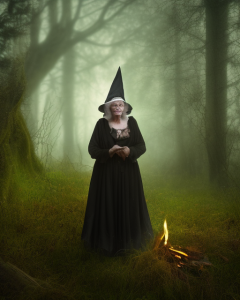 Wicca is a modern pagan, witchcraft religion that has its roots in the early 20th century. It was created by an Englishman named Gerald Gardner, who claimed to have discovered the existence of an ancient witch-cult in the 1940s. Since then, Wicca has evolved into a widely recognized and diverse spiritual path, with followers all over the world.
Wicca is a modern pagan, witchcraft religion that has its roots in the early 20th century. It was created by an Englishman named Gerald Gardner, who claimed to have discovered the existence of an ancient witch-cult in the 1940s. Since then, Wicca has evolved into a widely recognized and diverse spiritual path, with followers all over the world.
The history of Wicca is often shrouded in mystery, with many conflicting accounts and little documented evidence. However, it is widely accepted that the origins of Wicca can be traced back to Gerald Gardner, who was born in 1884 in England. Gardner was a retired British civil servant and an amateur archaeologist with a strong interest in folklore and the occult. He was initiated into a coven of witches in the New Forest area of England in 1939, which he claimed had been practicing an ancient form of witchcraft for centuries.
Gardner’s involvement with this coven was the starting point for his creation of Wicca. He drew upon the traditions and rituals of the coven, combined with elements of Ceremonial Magic and the Hermetic Order of the Golden Dawn, to develop a new form of witchcraft. In the late 1940s and early 1950s, Gardner wrote several books on Wicca, including “Witchcraft Today” and “The Meaning of Witchcraft”. These books served as a blueprint for the religion, and helped to spread the teachings of Wicca beyond the coven and into the wider world.
One of the key principles of Wicca is the worship of a goddess and god, often referred to as the Lady and the Lord. This dual deity is seen as a symbol of the balance between male and female energy, and is often depicted as the Moon and the Sun. Wiccans also believe in the existence of elemental spirits and nature spirits, which are honored and invoked in their rituals. Another important aspect of Wicca is the practice of magic, which is seen as a way to bring about positive change in one’s life and the world.
Wicca quickly gained popularity in the mid-20th century, especially among young people who were attracted to its spiritual independence and eclectic approach to religion. The movement was further fueled by the counter-culture and anti-establishment sentiment of the 1960s and 1970s, which saw a revival of interest in paganism and witchcraft. This led to the creation of numerous covens and groups, each with their own interpretation and practice of Wicca.
Despite its growing popularity, Wicca was still widely misunderstood and often associated with dark magic and devil worship. This led to discrimination and persecution of Wiccans, and the religion remained largely underground until the late 20th century. However, the rise of the feminist and LGBTQ rights movements in the 1970s and 1980s helped to bring Wicca into the mainstream, and it became more widely accepted as a legitimate spiritual path.
Today, Wicca is recognized as a valid religion by many governments and institutions around the world. Its followers come from all walks of life, and the religion continues to evolve and diversify as new generations of Wiccans bring their own experiences and perspectives to the craft. While the origins of Wicca are still shrouded in mystery, its influence and impact on the modern pagan and witchcraft communities are undeniable.
In conclusion, the history of Wicca is a rich and complex story that spans over 70 years. From its humble beginnings as a small coven in the New Forest area of England, Wicca has evolved into a widely recognized and respected religion with followers all over the world. Despite the challenges and persecution it has faced along the way, Wicca remains a vibrant and thriving spiritual path


